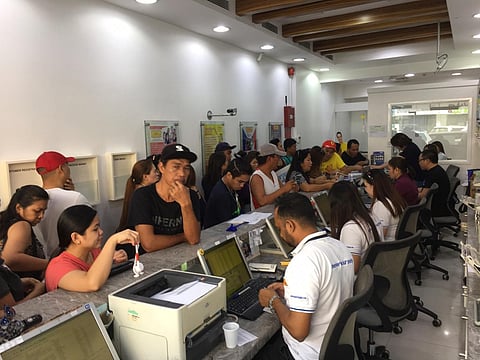OFWs: 4 ways ‘zero remittance week’ could backfire
Drive among Duterte's OFW supporters set to mark former strongman’s 80th birthday

Manila: Today, March 28, marks the 80th birthday of Philippines' ex-President Rodrigo Duterte.
A “global prayer rally” has been organised to honour the former strongman, as he starts being an octogenarian while in detention in The Hague.
Many Overseas Filipino Workers (OFWs) are on a warpath: the pro-Duterte camp among them has made loud appeals on social media to support “zero-remittance week”.
Their call: don’t send money home from March 28 to April 4, 2025.
It’s an act of defiance for some, and self-sabotage for others.
Duterte remains hugely popular, especially among OFWs.
“Zero remit” aims to support calls for Duterte’s return home following his detention at the International Criminal Court (ICC) in the Netherlands, where he faces charges of alleged crimes against humanity.
It’s a largely symbolic one.
Organisers see as is a non-violent, economic signal, one geared towards grabbing attention, but without “collateral damage”.
But such open defiance could turn ugly for them, their families and the deeply divided country. For OFWs, it could hit both their status and their pockets. Perhaps the only upside: it could force reckoning of the Filipino migration phenomenon.
Here’s how the “zero-remittance week” threat could potentially backfire:
#1. OFWs could shoot themselves in the foot:
The week-long no-remittance campaign could backfire immediately – on the families of OFWs themselves.
Such minor inconveniences could be seen as a price to pay by militant OFWs for supporting the tough-talking Duterte, who remains hugely popular.
Among Filipinos, it’s a cultural thing: an expression of “utang na loob” (debt of gratitude). Internet speeds and online payments were remarkably enhanced during Duterte’s watch. He also led the doubling of salaries of uniformed personnel, while ramping up infrastructure.
The former president, too, is credited for immediately solving the “laglag-bala” hustlers preying on OFWs and travellers at Philippine airports.
But as the zero-remit campaign falls during the graduation and Lenten season, this could mean the expenses of loved ones, including utilities and school fee payments – may have to be postponed.
Zero-remit may prove to be a storm in a tea cup.
#2. Withdrawal of travel tax exemption:
This is a big one. OFWs are travel tax-exempt, as per Section 2 of Presidential Decree 1183 (as amended). Even OFW dependents enjoy travel tax privileges.
While every regular passenger in the Philippines must pay Php2,700 (full travel tax, first class passage) or Php1,620 (economy class), OFW dependents only pay a reduced amout of Php400 (first class) and Php300 (economy).
One signature of the sitting president, Ferdinand Marcos Jr., could scrap those privileges, remove the special status of OFWs and further deepen divisions in an already-divided nation.
#3. Scrubbing of tax perks
One act of Congress, currently dominated by pro-Marcos legislators, could show OFWs who’s the boss.
The perks, including income tax and travel/airport tax exemptions for them and their dependents, could go.
This won’t be easy to pull off – a number of OFW-backed “party lists” sit in the current Congress. OFWs also have a strong support in the Senate.
But once enacted, the withdrawal of OFW perks would be extremely difficult to change.
The sovereign Filipino people, of course, is the biggest boss under the 1987 Constitution. Now, however, given the bickering between two biggest political families the voters elected it’s anyone’s guess how this unfolding drama could benefit them long term.
#4. Remittances are a double-edge sword
According to the World Bank, OFWs significantly bolster the Philippine economy through their remittances, which reached $38.34 billion in 2024, accounting for 8.3 per cent of the country's GDP.
Inward remittances enhance household consumption, stimulate local businesses, and contribute to poverty reduction.
Additionally, remittances help stabilise the nation’s current account by mitigating chronic deficits and supporting the peso’s value.
Remittances, however, also pose economic risks.
These include reduced domestic labour participation (“brain drain”) and potential economic vulnerabilities. Over-reliance on remittances can slow domestic job creation and economic diversification.
It also ramps up inflationary pressure as increased consumption may drive up prices, making essentials less affordable.
So while remittances are vital, diversifying economic strategies remains essential for sustainable growth for the Asian nation, the bank stated.



